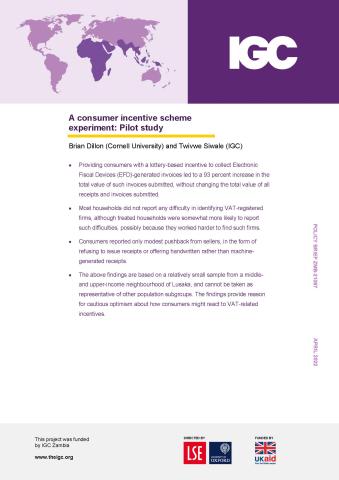A consumer incentive scheme experiment: Pilot study
This policy brief describes the goals, activities, and findings of a pilot experiment on the use of consumer incentives to increase VAT compliance for retail sales transactions in Zambia.
-
Dillon and Siwale Policy brief March 2023
PDF document • 292.45 KB
- Providing consumers with a lottery-based incentive to collect Electronic Fiscal Devices (EFD)-generated invoices led to a 93% increase in the total value of such invoices submitted, without changing the total value of all receipts and invoices submitted.
- Most households did not report any difficulty in identifying VAT-registered firms, although treated households were somewhat more likely to report such difficulties, possibly because they worked harder to find such firms.
- Consumers reported only modest pushback from sellers, in the form of refusing to issue receipts or offering handwritten rather than machine-generated receipts.
- The above findings are based on a relatively small sample from a middle- and upper-income neighbourhood of Lusaka, and cannot be taken as representative of other population subgroups. The findings provide reason for cautious optimism about how consumers might react to VAT-related incentives.




